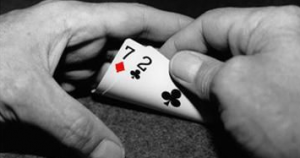As we’ve already established in a few past articles, there are numerous parallels between poker and psychology. You know where else psychology matters? Sales. If you’ve ever been an outbound telemarketing agent, then you definitely appreciate where we’re coming from with that statement. Indeed, if you’re not careful you will find that you’ll get sucked into one of the worst places for a poker player to be.
How bad is this place? It’s like this — if you get sucked into place, you might think at first that there’s no danger. After all, most guides — including all of our guides — tell you to seek out a version of this place. That’s because the version that we speak of is actually beneficial. However, if that place crosses over into the dark side, then you’re really in trouble.
So let’s reveal what we’re talking about, shall we? We’re referring to the dog ring of poker.
Now, let’s be honest — poker is a social game, and social games involve people. People come from all different walks of life, which means that they are going to have their good days and their bad days. If someone is playing on tilt and they’re having a hard time and there’s already a social feature or three set up, you can bet that they’re going to vent.

Venting is good …in small doses. When you’re trying to become a great poker player, you need to avoid the dog ring. It’s usually the part of the message board where everyone comes to complain about their poker player. They got bad cards. They had a bad day at work. Their girlfriend was yelling at them about cleaning the dishes and they really have no desire to be up to their elbows in dish soap — especially when there’s a tournament happening online!
The dog ring in sales got its name because most supervisors noticed that the weakest people were always outside in the “smoke pit”, “barking” about how some customer wasn’t bright enough to know a good offer when they saw it, or how another customer kept ranting about something that had nothing to do with the original complaint. However, what about the things that the salesperson could have controlled? What about the offer in question? Isn’t that worth something to step back and think about the things we can control versus the things that we can’t.
In the game of poker, we can certainly control when we call, when we raise, and most importantly — when we fold. You might feel that everything in poker is outside your control, but it’s really not. You will need to step back and look at the things that you can control, and then make a strategy based on the game going on around you. If you’re not someone that bluffs well, you might want to make sure that you leave that out of your toolbox for the moment until you do get good at bluffing.
It’s the same with looking at where to start. It’s better for your bankroll and your confidence to play at lower stakes until you are really certain that you’re going to be able to handle the game play at the higher stakes. While it’s more money on the table, it’s also a lot of problems that are best avoided if you really think about it. Competition gets tougher the higher you go, and if you aren’t faring well against people in your current tier, you might find yourself without a bankroll quickly at the higher levels.
After reading this, you might feel that we’re bashing message boards and forums — we’re not. That’s not the point of this at all. You can use forums, but we recommend using them productively. Logging onto the boards just to complain about how your cards were bad and you were tired from work and your life isn’t going the way you want it to is a waste of your time — you could be practicing more poker!
In addition, you don’t always have to play for money — even at a money-casino you can play practice games for free. This will let you go head to head against humans without watching your bankroll pay the ultimate price. Poker is not the only arena where people practice, you know — investors “paper trade” before they put real money at stake so that they know when to act and when to react. This isn’t a sign of weakness, but a point of strength that you might want to adopt for your own strategy.
It could take you years and years to finally refine your strategy, but the truth is that anything worth having is worth fighting for — avoid the dog ring of poker, and see how fast your game improves!
